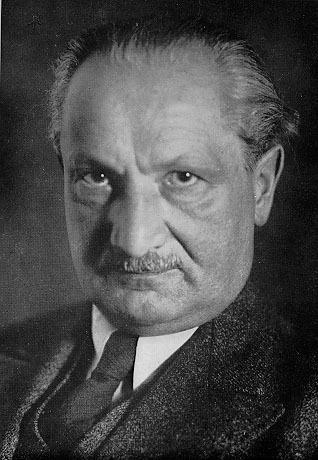Martin Heidegger (Martin Heidegger)

Martin Heidegger (/ˈhaɪdɛɡər, -dɪɡər/; German: [ˈmaɐ̯tiːn ˈhaɪdɛɡɐ]; 26 September 1889 – 26 May 1976) was a German philosopher and a seminal thinker in the Continental tradition and philosophical hermeneutics. According to the Internet Encyclopedia of Philosophy, he is “widely acknowledged to be one of the most original and important philosophers of the 20th century”. Martin Heidegger is best known for his contributions to phenomenology and existentialism, though as the Stanford Encyclopedia of Philosophy cautions, “his thinking should be identified as part of such philosophical movements only with extreme care and qualification”. His first and best known book, Being and Time (1927), though unfinished, is one of the central philosophical works of the 20th century. In the first division of the work, Heidegger attempted to turn away from “ontic” questions about beings to ontological questions about Being, and recover the most fundamental philosophical question: the question of Being, of what it means for something to be. Heidegger approached the question through an inquiry into the being that has an understanding of Being, and asks the question about it, namely, Human being, which he called Dasein (“being-there”). Heidegger argued that Dasein is defined by Care, its practically engaged and concernful mode of Being-in-the-world, in opposition to Rationalist thinkers like René Descartes who located the essence of man in our thinking abilities. For Heidegger thinking is thinking about things originally discovered in our everyday practical engagements. The consequence of this is that our capacity to think cannot be the most central quality of our being because thinking is a reflecting upon this more original way of discovering the world. In the second division, Heidegger argues that human being is even more fundamentally structured by its Temporality, or its concern with, and relationship to time, existing as a structurally open “possibility-for-being.” He emphasized the importance of Authenticity in human existence, involving a truthful relationship to our thrownness into a world which we are “always already” concerned with, and to our Being-towards-death, the Finitude of the time and being we are given, and the closing down of our various possibilities for being through time.
Martin Heidegger also made critical contributions to philosophical conceptions of truth, arguing that its original meaning was unconcealment, to philosophical analyses of art as a site of the revelation of truth, and to philosophical understanding of language as the “house of being.” Heidegger’s later work includes criticisms of technology’s instrumentalist understanding in the Western tradition as “enframing,” treating all of Nature as a “standing reserve” on call for human purposes. Martin Heidegger is a controversial figure, largely for his affiliation with Nazism, as Rector of the University of Freiburg for 11 months, before his resignation in April 1934, for which he neither apologized nor publicly expressed regret, although in private he called it “the biggest stupidity of his life” (die größte Dummheit seines Lebens).
Born
- September, 26, 1889
- Meßkirch, Germany
Died
- May, 26, 1976
- Freiburg im Breisgau, Germany
Cemetery
- Messkirch Town Cemetery
- Meßkirch, Germany



